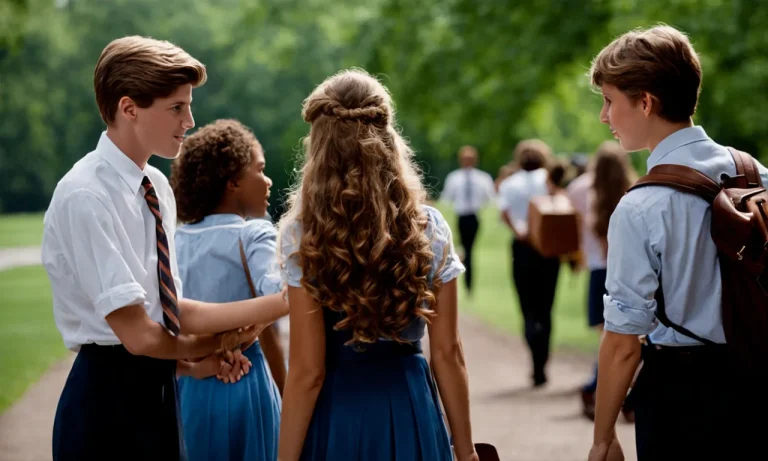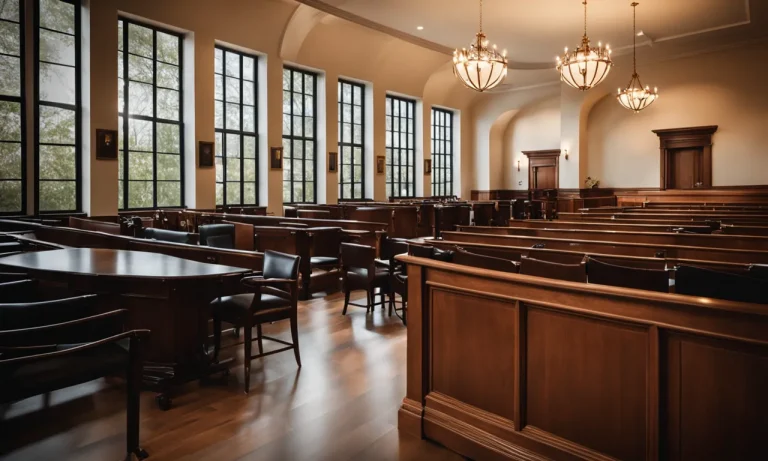Schools have a legal obligation to report suspected child abuse and neglect to Child Protective Services (CPS). However, parents sometimes feel schools overstep their authority and make frivolous reports to CPS that traumatize families and waste resources.
This raises the question – can you sue a school for calling CPS?
If you’re short on time, here’s a quick answer to your question: You can sue a school for calling CPS, but it’s very difficult to win these kinds of lawsuits. Schools and teachers generally have legal immunity when making good faith reports to CPS.
You would need to prove the school acted with malice, without justification, and caused harm.
In this comprehensive guide, we will cover:
Legal Obligations to Report Child Abuse
When it comes to child abuse, the safety and well-being of the child should always be the top priority. In order to protect children from harm, there are legal obligations in place that require certain individuals and organizations, including schools, to report suspected cases of child abuse.
These obligations are aimed at ensuring that children receive the necessary support and intervention to address any abusive situations they may be facing.
View this post on Instagram
Mandatory reporting laws
One of the key aspects of the legal obligations to report child abuse is the existence of mandatory reporting laws. These laws vary from state to state, but generally require professionals who work closely with children, such as teachers and school staff, to report suspected cases of child abuse to the appropriate authorities, such as Child Protective Services (CPS) or the local law enforcement agency.
Failure to comply with these laws can have serious consequences, both legally and ethically.
These mandatory reporting laws are in place to ensure that any potential child abuse is promptly addressed and investigated. They serve as a crucial mechanism to protect vulnerable children and hold perpetrators accountable for their actions.
By reporting suspected abuse, schools and their staff play a vital role in safeguarding the well-being of their students.
Reasonable suspicion standard
In order to trigger the obligation to report child abuse, schools and their staff typically need to have a “reasonable suspicion” that abuse has occurred. This means that they don’t need to have concrete proof or evidence of abuse, but rather a reasonable belief based on their observations, interactions, or any information they may have received.
This standard is in place to prevent instances where potential abuse goes unreported due to lack of concrete evidence.
It is important to note that schools and their staff are not responsible for investigating or determining whether the abuse actually occurred. Their role is to report any suspicions they may have to the appropriate authorities, who will then conduct a thorough investigation to determine the validity of the allegations.
Penalties for failure to report
The penalties for failing to report suspected child abuse can vary depending on the jurisdiction and the specific circumstances. In some cases, individuals who fail to fulfill their legal obligations may face criminal charges or civil liability.
These penalties are in place to emphasize the importance of reporting suspected abuse and to hold those who neglect their responsibilities accountable.
It is crucial for schools and their staff to understand and comply with their legal obligations to report child abuse. By doing so, they not only fulfill their duty to protect children but also contribute to creating a safe and nurturing environment for all students.
Ver esta publicación en Instagram
Immunity for Good Faith Reports
When it comes to reporting suspected child abuse or neglect, schools play a crucial role in ensuring the safety and well-being of their students. However, there may be situations where a school’s report to Child Protective Services (CPS) is questioned, leading some individuals to wonder if they can sue the school for calling CPS.
It is important to understand that in many cases, schools are protected by immunity laws when making these reports in good faith.
Federal and state immunity laws
Both federal and state laws provide immunity protections for individuals or entities, such as schools, who make reports of suspected child abuse or neglect to CPS. These laws were put in place to encourage people to report their concerns without fear of retaliation or legal repercussions.
Immunity laws vary by jurisdiction, but generally, they protect those who make reports in good faith from being sued for defamation, invasion of privacy, or other related claims.
For example, under the federal Child Abuse Prevention and Treatment Act (CAPTA), individuals who make reports of suspected child abuse or neglect are immune from civil or criminal liability as long as the report was made in good faith.
Similarly, many states have enacted their own immunity laws that provide protection to those who report suspected child abuse or neglect in good faith.
What constitutes a ‘good faith’ report
To qualify for immunity protections, a school’s report to CPS must be made in good faith. This means that the report must be based on a honest belief or suspicion that a child is being abused or neglected.
Schools should not make reports with malicious intent or for personal gain, as this may not meet the criteria for a ‘good faith’ report.
It is important for schools to have clear policies and procedures in place when it comes to reporting suspected child abuse or neglect. By providing training and guidance to staff members, schools can ensure that reports are made in a responsible and sincere manner, increasing the likelihood of falling within the ‘good faith’ criteria.
Rebutting the presumption of good faith
While schools generally enjoy immunity protections for making reports in good faith, there may be circumstances where the presumption of good faith can be challenged. For example, if it can be proven that the school knowingly made a false report or acted with malicious intent, the immunity protections may not apply.
It is important to note that challenging the presumption of good faith can be a complex legal process. Those who believe they have been wrongfully reported to CPS by a school should consult with an attorney who specializes in child abuse and neglect cases.
They can provide guidance on how to gather evidence and navigate the legal system to seek appropriate remedies.
View this post on Instagram
Grounds for a Lawsuit against a School
While schools have a legal duty to ensure the safety and well-being of their students, there are certain circumstances where their actions or lack of action may give rise to a lawsuit. Here are some grounds that could potentially lead to a lawsuit against a school for calling Child Protective Services (CPS).
Reporting without reasonable suspicion
Schools are mandated reporters, meaning they are required by law to report suspected child abuse or neglect to CPS. However, this duty is not without limitations. If a school calls CPS without reasonable suspicion or credible evidence, it could be seen as an abuse of this reporting power.
In such cases, parents may have grounds to sue the school for making a false report, causing unnecessary stress, and potentially damaging their reputation.
Knowingly providing false information
If a school knowingly provides false information to CPS during an investigation, it can have serious consequences for both the child and the parents. Not only can it result in an unwarranted intrusion into the family’s life, but it can also lead to emotional distress and reputational harm.
In these instances, parents may have grounds to sue the school for defamation, intentional infliction of emotional distress, or other related claims.
Using threats of CPS to gain compliance
In some unfortunate cases, schools may use the threat of involving CPS as a means to gain compliance from parents or students. This can be highly distressing for families and can create an atmosphere of fear and mistrust.
If a school abuses its power by making false threats or using CPS as a tool for coercion, parents may have grounds to pursue legal action against the school for emotional distress, invasion of privacy, or violation of their constitutional rights.
It’s important to note that each case is unique, and the viability of a lawsuit against a school for calling CPS will depend on the specific facts and circumstances. Consulting with an attorney who specializes in education law can provide guidance and help determine the best course of action.
Proving Harm Caused by a False Report
When a school calls Child Protective Services (CPS) on a parent or guardian, it can have serious consequences for both parties involved. In some cases, the report may be false or made out of spite, leading to unnecessary stress and hardship.
However, proving the harm caused by a false report can be challenging, but it is not impossible.
Physical and emotional distress
Being falsely accused of child abuse or neglect can cause significant physical and emotional distress. The fear, anxiety, and uncertainty that come with such accusations can take a toll on the accused parent or guardian’s well-being.
The stress of being investigated by CPS, undergoing intrusive interviews, and potentially facing legal action can lead to sleep disturbances, loss of appetite, and other physical symptoms.
Furthermore, the emotional toll of being falsely accused can be devastating. Parents may experience feelings of guilt, shame, anger, and betrayal. The strain on their mental health can affect their ability to parent effectively and may require therapy or counseling to overcome.
Lost wages and legal fees
Dealing with a false report can also result in lost wages and hefty legal fees. When a parent or guardian is under investigation by CPS, they may be required to take time off work to attend meetings, court hearings, or other related appointments.
This can result in lost income, making it difficult to meet financial obligations and support their family.
In addition, if the accused parent decides to pursue legal action against the school for making a false report, they may incur substantial legal fees. Hiring an attorney to navigate the legal process can be expensive, further adding to the financial burden caused by the false report.
Damage to reputation and relationships
A false report of child abuse or neglect can have long-lasting effects on a person’s reputation and relationships. Even if the accusations are proven false, there may still be lingering doubts and suspicions in the minds of others.
The accused parent may face judgment, isolation, and strained relationships with friends, family, and the community.
Moreover, the false report can impact the parent’s relationship with their child. The child may have been temporarily removed from their custody during the investigation, causing a rupture in the parent-child bond.
Rebuilding trust and repairing the relationship can be a challenging and lengthy process.
It is important to note that each case is unique, and the extent of the harm caused by a false report can vary. If you believe you have been unjustly reported to CPS, it is recommended to consult with a legal professional to understand your rights and explore any potential legal remedies.
Conclusion
While schools are obligated to report suspected abuse and given immunity for good faith reports, there are rare instances where families prevail in lawsuits against schools for malicious and unfounded reports to CPS.
By understanding the legal standard for mandatory reporting, the criteria for ‘good faith’, and how to prove damages, families can determine if they have grounds for a case against a school district or officials. However, the bar is very high, so these lawsuits are still relatively uncommon.






